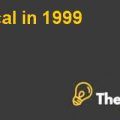PART 1:
The historic data of the fund indicates that the fund’s performance is better than the benchmark. In 1998, the fund’s annual return was 43.53%, whereas the benchmark only generated 28.36%. However, the higher return also faces higher risk as shown in the calculation of beta. Beta of the fund is 1.19, which means the fund is facing higher risk as compared to the market. In addition to this, the fund has the potential to earn more than the market return as well.
The annual return of 40.64% is generated by the funds in 2009, whereas the benchmark generates 25.29% which indicates that Bill Miller’s investment strategy is good however it is different from the market investors. In addition to this, as the fund faces higher risk than the market, the performance from 2010 to 2015 is not reasonable as the fund generate less return than the benchmark.
Market Efficiency:
Financial markets are the much larger than the product and real estate market and the volatility in the financial market is also high as the number of transactions in the market is numerous, which is considered as the volume in the market. However, in different markets like real estate, the number of transaction is low which is why this is less volatile market.
Market efficiency determines that the stocks and any financial instrument vary on the information from the outside which might include environmental and political news etc. Numerous theses justified that the security market reflects the information about the particular stock or for the whole market. Legg Mason value trust is a mutual fund which contains many stocks as well as other financial instruments in its portfolio. Therefore, Mutual fund is also subject to market risk and faces the informational risk as well.
As the market performance is based on traders’ expectations and behaviors, therefore it is difficult to predict a particular stock or a market as a whole. Sometimes the market performs irrationally, which indicates that there is no justification behind the movement of a single stock or any relevant news for that stock.
The market works on expectationstherefore, if the mutual fund performs above the expectation, then the price of the mutual fund units will increase and in case where the performance of the mutual fund is below the expectations then the prices of units will decrease sharply. This justification applies on the Legg Mason Value Fund which means that the fund does not provide any dividend in the history therefore, the investor does not expect the dividend from the fund. In case where the fund announces dividends, then the investor will trade more units therefore, the prices of unit will increase.
Grossman/Stieglitz Theorem stated that the manager of the fund should be active regarding the information relevant to its portfolio and in a situation where the manager does not apply proper trading will result in a high transaction cost as well as poor performance of the fund........
This is just a sample partical work. Please place the order on the website to get your own originally done case solution.












